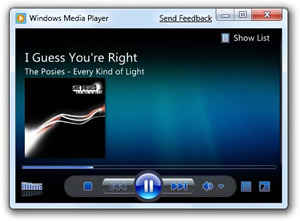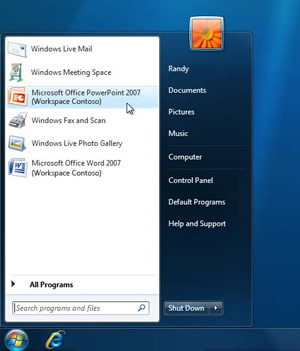
Microsoft to Offer Six versions For Windows 7, Easier Migration From XP
Microsoft on Tuesday said it will heavily promote two main versions of the next Windows operating system in an attempt to avoid the problems it faced by marketing four tiers of the Windows Vista system.
Windows 7, which is officially expected at the end of January 2010, will be available in six different versions at least.
 Microsoft said that there will be two primary editions of Windows 7: Windows 7 Home Premium for consumers, and Windows 7 Professional for businesses. Prices have not yet been disclosed.
Microsoft said that there will be two primary editions of Windows 7: Windows 7 Home Premium for consumers, and Windows 7 Professional for businesses. Prices have not yet been disclosed.
"Windows 7 Home Premium gives consumers a full-function PC experience and a visually rich environment in everything from the way they experience entertainment to the way they connect their devices," said Windows General Manager Mike Ybarra.
"Windows 7 Professional is the recommended choice for small businesses and for people who work at home but have to operate in an IT-managed or business environment where security and productivity are critical. For those running Windows Vista Business, it will be a very logical move to Windows 7 Professional," Ybarra explained.
In addition, it will sell two lower-end versions, Home Basic and Starter edition, to PC makers. The Home Basic edition is intended for sale in developing countries, while computer makers can install the Starter edition on PCs intended for sale anywhere in the world. Neither sport the sleeker appearance introduced with Vista, which is getting a makeover in Windows 7.
The company will also sell a top-end Enterprise version for big corporate customers and a similar Ultimate version for consumers. Those versions will include security features and a few other tools not available in the two main versions.
"This edition will not be available at retail or by OEMs for preinstallation on a new PC. Windows 7 Enterprise edition offers advanced data protection, lower cost compliance and IT tools to streamline PC management and help save costs, while enabling access to information from anywhere for business users," Ybarra added.
XP-to-Windows-7 upgrades
Microsoft also said that it will sell what it calls "upgrades" for Windows 7 to users running the aged Windows XP operating system.
Users will have to purchase an upgrade license (discounted) to move from Windows XP to Windows 7. Those users, however will have to do a "clean" installation of Windows 7, meaning that all data on the machine will be lost.
Windows 7 on Netbooks
Microsoft also said all versions of Windows 7 will run well on netbooks.
"Microsoft is offering a clear path for Windows 7 across the board, so as we demonstrated at PDC, WinHEC and CES, Windows 7 provides a great user experience on small-notebook PCs," said Brad Brooks, corporate vice president for Windows Consumer Product Marketing.
"With Windows 7, we?ve matched hardware improvements with some investments of our own. With Windows 7 we are on track to have a smaller OS footprint; an improved user interface that should allow for faster boot-up and shut-down times; improved power management for enhanced battery life; enhanced media capabilities; and increased reliability, stability and security," Brooks added.
"These engineering investments allow small notebook PCs to run any version of Windows 7, and allow customers complete flexibility to purchase a system which meets their needs. For OEMs that build lower-cost small notebook PCs, Windows 7 Starter will now be available in developed markets. For the most enhanced, full-functioning Windows experience on small notebook PCs, however, consumers will want to go with Windows 7 Home Premium, which lets you get the most out of your digital media and easily connect with other PCs."

 Microsoft said that there will be two primary editions of Windows 7: Windows 7 Home Premium for consumers, and Windows 7 Professional for businesses. Prices have not yet been disclosed.
Microsoft said that there will be two primary editions of Windows 7: Windows 7 Home Premium for consumers, and Windows 7 Professional for businesses. Prices have not yet been disclosed.
"Windows 7 Home Premium gives consumers a full-function PC experience and a visually rich environment in everything from the way they experience entertainment to the way they connect their devices," said Windows General Manager Mike Ybarra.
"Windows 7 Professional is the recommended choice for small businesses and for people who work at home but have to operate in an IT-managed or business environment where security and productivity are critical. For those running Windows Vista Business, it will be a very logical move to Windows 7 Professional," Ybarra explained.
In addition, it will sell two lower-end versions, Home Basic and Starter edition, to PC makers. The Home Basic edition is intended for sale in developing countries, while computer makers can install the Starter edition on PCs intended for sale anywhere in the world. Neither sport the sleeker appearance introduced with Vista, which is getting a makeover in Windows 7.
The company will also sell a top-end Enterprise version for big corporate customers and a similar Ultimate version for consumers. Those versions will include security features and a few other tools not available in the two main versions.
"This edition will not be available at retail or by OEMs for preinstallation on a new PC. Windows 7 Enterprise edition offers advanced data protection, lower cost compliance and IT tools to streamline PC management and help save costs, while enabling access to information from anywhere for business users," Ybarra added.
XP-to-Windows-7 upgrades
Microsoft also said that it will sell what it calls "upgrades" for Windows 7 to users running the aged Windows XP operating system.
Users will have to purchase an upgrade license (discounted) to move from Windows XP to Windows 7. Those users, however will have to do a "clean" installation of Windows 7, meaning that all data on the machine will be lost.
Windows 7 on Netbooks
Microsoft also said all versions of Windows 7 will run well on netbooks.
"Microsoft is offering a clear path for Windows 7 across the board, so as we demonstrated at PDC, WinHEC and CES, Windows 7 provides a great user experience on small-notebook PCs," said Brad Brooks, corporate vice president for Windows Consumer Product Marketing.
"With Windows 7, we?ve matched hardware improvements with some investments of our own. With Windows 7 we are on track to have a smaller OS footprint; an improved user interface that should allow for faster boot-up and shut-down times; improved power management for enhanced battery life; enhanced media capabilities; and increased reliability, stability and security," Brooks added.
"These engineering investments allow small notebook PCs to run any version of Windows 7, and allow customers complete flexibility to purchase a system which meets their needs. For OEMs that build lower-cost small notebook PCs, Windows 7 Starter will now be available in developed markets. For the most enhanced, full-functioning Windows experience on small notebook PCs, however, consumers will want to go with Windows 7 Home Premium, which lets you get the most out of your digital media and easily connect with other PCs."






















